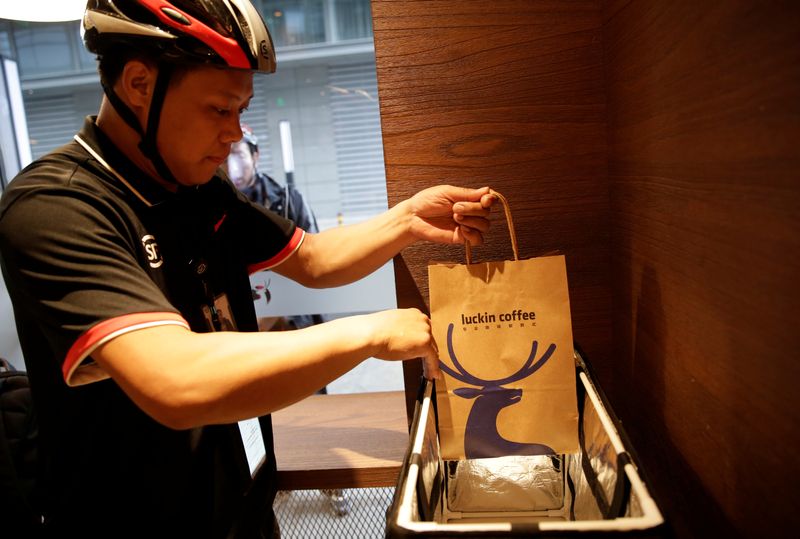By Casey Hall and Marcelo Teixeira
SHANGHAI (Reuters) - Chinese coffee consumption is growing quickly, spurring cut-throat competition between local and foreign coffee chains that have opened thousands of branded shops in recent months and surpassed the number of coffee stores in the United States.
Analysts expect China's growing thirst for coffee to be a key driver of future demand for the beans as coffee shops expand beyond Beijing and Shanghai to dozens of mid-sized cities where young professionals have warmed to the beverage.
China's rising coffee demand is an opportunity for international chains like Starbucks (NASDAQ:SBUX) and Tim Hortons that are investing heavily in China, though they face a steep challenge from rapidly expanding local brands.
Data from the International Coffee Organization sent to Reuters shows coffee consumption in China grew 15% in the year-long season ended in September from the previous cycle to 3.08 million bags.
"The Chinese consumer is increasingly adopting Western life styles and coffee is obviously one of the beverages that represent that," said Jason Yu, greater China managing director of market research firm Kantar Worldpanel.
The number of branded coffee shops in China grew a staggering 58% in the last 12 months to 49,691 outlets, according to Alegra Group, a company that tracks growth of coffee chains.
There is harsh competition between the local chains and international chains, said Matthew Barry, a beverages analyst for Euromonitor. Each one is trying to grab as big a share as they can of the growing market, he said.
Alegra Group estimates China's Luckin Coffee (OTC:LKNCY) added 5,059 stores in the last 12 months, while another Chinese chain, Cotti Coffee, opened 6,004 outlets in the period.
"The scale of the opportunity is such that both (local and international chains) will have to be very aggressive in facing off against the other and I think that should ensure a very dynamic marketplace in the next few years," Barry said.
U.S.-based Starbucks opened 700 stores in China in the last year and said it is on track to operate around 9,000 stores in the country by 2025, while Canada's Tim Hortons plans to have 3,000 stores in the country in four years.
Seizing market share is one of Luckin's core targets, Chief Executive Jinyi Guo said during the firm's third quarter earnings call.
Store openings are now happening in China's smaller cities, Jason Yu said, which still have millions of inhabitants each.
"So that basically means in those places there's still a lot of white space for coffee chains to grow," he said.
Zixi Zhao, a 20-year old Beijing student, said he drinks coffee every day.
"I started drinking when I went to college," he said. "I don't drink much tea in general, but my mom, my dad, my grandmother they all drink tea."
Ruoxuan Zhao, a 19-year-old student from Beijing, said drinking coffee was part of the fast-paced lifestyle of young people in China, who welcome the caffeine boost.
HAPPY GROWERS
The development is good news for coffee producers already benefiting from high prices due to adverse weather in some growing regions. Arabica coffee futures are trading near the highest in eight months, while robusta coffee hit the highest in 15 years last week.
China imports coffee mostly from Africa and South America.
Brazil's coffee exporters group Cecafe said that shipments to China will nearly triple in 2023 to surpass 1 million bags for the first time, making China its eighth-largest market.

The United States Department of Agriculture sees China using 5 million bags of coffee in the new season (2023/24), which would make it the world's seventh-largest consumer.
Chinese coffee consumption still pales when compared to top consumers the United States and Brazil that use more than 20 million bags per year. But the growing demand signals China is undergoing a cultural change similar to other tea-loving Asian countries including Japan and South Korea.
